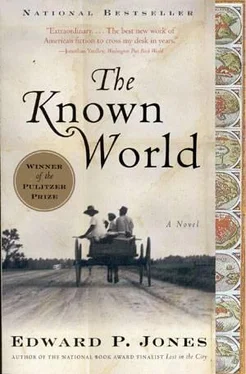Maude was the first to return home. She might have stayed on longer but she knew that all the talk of legacy would have hardened Caldonia against what she was saying. And Maude was anxious to get back to her lover, the one she had taken after her husband’s murder. That lover, Clarke, a slave, had been left in charge of her place, and she trusted him perhaps as much as she trusted her own children. Clarke had taught himself to read and write, and Maude’s trust flowed from the fact that he had, only weeks before the death of her husband, Tilmon Newman, come and told her what he was now able to do. She had not been left to find out on her own, to come upon him unexpectedly with his head in a book and Clarke hurriedly trying to explain it away by turning the book upside down and pretending he did not really know what he was doing. That had happened to a white couple, acquaintances of Maude’s in Amelia County. It had frightened the white woman, seeing the incongruity of a nigger with a book, she told Maude after the slave, Victoria, had been whipped and told to forget what she knew. It frightened her more than walking into the barn and seeing a mule singing hymns or speaking the Lord’s words, the woman told Maude.
“Do you know,” Maude had said the first time she and Clarke had lain together, “that if I was a white woman, they would come in here and tear you from limb to limb?” “And what they gon do with you being colored?” he asked. Maude, delighted that she had taken such a step in her life, lay back, the sweat over her body still drying. “I suspect that since I own you, since I have the papers on you, they might do the same thing if I up and screamed. They wouldn’t be as fast, I suppose, but they would come, Clarke.” He said nothing.
Calvin followed his mother two days later, though he had very little to get back to. The place Maude owned had grown smaller and smaller over time as she rented portions of her land. She also rented out many of her slaves; each leased slave could bring in as much as $25 a year, and the renter was responsible for meals and upkeep while renting the slave, so just about all of the $25 was profit. Calvin was not an idle man, and he would work in the fields that remained alongside his mother’s servants. But the toiling, even before Henry Townsend died, did not fulfill him as it had once. And when he returned home after Henry’s death, he picked himself up and went out into the ever-decreasing fields only because he knew he would waste away otherwise. He would come to blame it all on slavery. Had he and Clara Martin, cousin to Winifred Skiffington, ever spoken, he might have understood her sense of miasma. A pain generated by the very air around him seeped into his bones and settled right next to the pain of silently caring for Louis.
Then Fern left. Her husband was at their place for all the time she had been away, abandoning his gambling sprees for the time being. But she had found, in her brief returns home, that he was becoming increasingly erratic and she could not depend on him to run things the way she knew they had to be run. Hers was not as large an estate as Caldonia’s but, as she had told her students, size did not determine the vulnerability to rot. She had taught that the ruin of an empire could start not with rebellion in the farthest reaches of the empire, but in the attic or bedroom or the kitchen of the emperor’s palace where he had allowed domestic chaos to fester and eventually bring down the palace, and with the palace the empire could follow. Her husband was not a man given to drink all the time, she said to Caldonia once, but he often acted with the irresponsibility of a drunkard. It would have been better if he were a drunkard, she continued, then at least he would have the benefit of the gaiety that came with drink.
Caldonia stood on the verandah and watched Fern go off, Loretta just behind her and to the left. They went inside and Caldonia read for much of the afternoon, then sewed with Loretta. Moses came that evening and told Caldonia about the first nail Henry had driven into a board in the kitchen, when the house was no more than a dream in his head.
The servant driving Fern home that day saw the man first and he told her there was someone up ahead in the road. It was nearing sundown, the sky afire with the red and the orange. The patrollers had already passed them, so Fern was assured that whoever it was was someone who had a legitimate reason to be in the road. “I can’t make it out,” Zeus the servant said to her. “It just a big somethin out there.” “It” was big because the man was sitting on a horse, but with the dying sun behind the man making him a large silhouette, what Zeus could make out was a figure of one piece, not quite man and not quite horse.
”You be Miss Elston?” the man said, taking off his hat when they were near. He was a Negro and Fern could see with the last of the day’s light that he was the color of a dark pecan.
“I be Jebediah Dickinson,” the man said.
“Are you looking for me, Mr. Dickinson?” Fern said.
“I am, ma’am, and yet I ain’t.”
“I am tired, Mr. Dickinson, riddles are not what I want this time of the day.”
“Your husband be owin me $500, and all I want is for him to pay so I can get where I need to be goin.” Ramsey Elston, her husband, had left home the day before, the need to gamble having finally claimed him after so many weeks.
“I assume you have been up to the house and that Mr. Elston is not there. Beyond that, I cannot help you. Pass on,” Fern said to Zeus, and he raised the reins but when the man began to speak, he dropped them again.
“A man would think that the debt of one be the debt of the other when two people are one and the same as man and wife.” The man had not moved. He was more or less catty-corner to the road, though not in any threatening way, and Zeus could have gone through if his mistress had ordered it so. Jebediah’s horse seemed the nervous sort, head forever up and down and tail wagging for all it was worth. The tail had been shortened but only Zeus, who was not around horses very much, noticed that.
“Is that so?” Fern said. Jebediah got down off the horse and came around to her and the horse’s tail stopped wagging and, a few moments later, his head stopping bobbing. “You are quite mistaken, Mr. Dickinson. Whatever Mr. Elston does out in the world is his business. It has nothing to do with me, no more than what you do in the world is my business.” I have been a dutiful wife.
“All I’m sayin, ma’am-”
“I do not care about all that you are saying. His debts are his own. If you are a gambler, and I assume that you are, you would know that.” She wondered when Ramsey had started gambling with black people. She wondered if he still gambled with white people. “Pass on,” she said to Zeus.
He was still there the next day and all the days after that for nearly a week. She came and went-once to Caldonia’s-and he said nothing to her, just raised his hat at her going and raised it again at her coming back. In the night he was still out there, for she could make out a small fire. And there was movement, though that could just as easily have been a bear. The patrollers often came up to him and he pulled out his papers from inside his shirt and they would move on. Fern could see him from her window far up the path. She should not have been able to see him: she had wanted trees planted just before the entrance, trees that would now have been high enough to block him out. But Ramsey had always wanted the view unobstructed.
What he ate Fern did not know, and her slaves could not tell her. Seven days after he was there he knocked at her door. Zeus opened it and told Jebediah his mistress didn’t like folks, slaves and Negro strangers like him, knocking at her front door. “Thas what they made the back door for,” Zeus said. “Then what they make the front door for?” Jebediah asked. Zeus closed the door, gently, as if he didn’t really want to make a fuss. In less than two minutes Fern came to the door, and Zeus, unsmiling, was behind her.
Читать дальше












